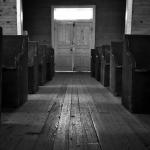This sermon is part of a series, Resist: Justice Heroes from the Bible to the Big Screen. Today’s text comes from Matthew 5.
In this series, we’ve focused on a phrase from each movie that is meant to be a mission-statement takeaway. Some are self-explanatory, like, “We boldly go.” Or “The force is with us.”
The one for today might take a little bit of context. It’s a little bit longer than all of the other ones. It’s the one phrase we pulled from the entire Harry Potter saga.
We solemnly swear that we are up to no good.
Does that sound a little counter-intuitive for a church? Well, you should know that the worship committee had some real and thoughtful conversation about that. We talked about changing it a bit to say, “We solemnly swear that we are up to some good.” But we decided that being up to no good was a very Saint Andrew thing to be. It’s subversive. Being up to no good means that maybe we aren’t bound to some of the assumptions and cultural norms that other churches might feel bound by. It clearly indicates the spirit of resistance at the heart of this whole sermon series. So, we went with it.
But it’s important to know what that particular phrase does in the world of Harry Potter. It is an incantation spoken over a special map called the Marauder’s Map. When you have this map in your hand and you tap it with your wand and say, “We solemnly swear that we are up to no good,” a map of the school and grounds appears that is very detailed. It includes, among other things, tiny moving dots to indicate every person on the property, so you can look at this map at any given time and see who is where. And it is the perfect tool for covert ops in the middle of the night, if you need to sneak around the school undetected.

We solemnly swear that we are up to no good.
And the map appears.
But before there were midnight roamings and enchanted maps, before any mischief was managed, Harry, like all the Hogwarts students before him, had to learn the basics of magic. First-year wizarding stuff. And the very first spell that you learn at the Hogwarts School of Witchcraft and Wizardry is a disarming spell. A one-word spell.
Expelliarmus.
It is a simple spell that removes the wand from the hand of your enemy and puts its power in your hand instead. What’s interesting is that the first-year students seem to grumble through this lesson because it seems so basic and boring. They want to know how to do big magic, like turn into creatures, to be transfigured. They want to know how to fend off the darkest of dark arts; they want to know how to concoct potions that make someone speak the truth. (I’d like to have that potion, too, as a matter of fact.)
They want to know how to do these big things, but first they have to learn this very basic disarming spell.
As it turns out, this particular spell is critical to our hero’s journey. In a way, it is both the beginning and the end.
The theme of nonviolence is woven throughout the Potter series. There is death and destruction, there are many brushes with all sorts of danger and dark magic; sometimes the adults have to employ more aggressive spells. But Harry Potter himself never uses an “unforgivable curses” to inflict pain or death. No matter what challenge he faces, and no matter how strong and powerful he grows as a wizard, he always finds another way to transform—or transfigure—his situation.
Our gospel for today is Matthew 5, the Beatitudes. In Matthew’s gospel, this Sermon on the Mount is Jesus’ first public act of ministry. It’s really telling because in all of the other gospels, the first thing Jesus does in public is something big and flashy—an exorcism or a miracle at a wedding. But Matthew goes another way. He’s puts this emphasis on the teaching ministry of Jesus, which shows you that throughout this gospel, the teaching and preaching are the most important thing. This means that of all the gospel writers, Matthew perhaps had the makings of a Hogwarts headmaster. Or at the very least, a transfiguration teacher. But he begins with this teaching to show how important the role is in all of Jesus’ life and ministry. And the most important thing Jesus had to teach was all captured in this first sermon. It is both a litany of blessing and blessedness, and the call to live in a “Third Way,” another way.
Not only does Jesus talk about blessing in a way that is subversive and empowers and lifts up the poor and the persecuted, he also overturns some long-held laws and traditions about revenge and retaliation. He takes the “stand your ground” laws of the Old Testament and breathes new life into them for a new day, for a new people who will embody God’s love and compassion. These laws of retaliation were so deeply embedded in the people’s being that they had a word for it: the lex talionis. Tell me that doesn’t sound like a magical spell from Hogwarts? The lex talionis are these rules for revenge and retaliation that tell who you can punish, and who and when, and how you should exact revenge for certain crimes. It’s all very detailed and gruesome if you go back to the original Old Testament text. But Jesus says this is not how we’re going to do things anymore.
Theologian Walter Wink explores all the ways in which Jesus teaches not just the non-violence and passivity, but a “Third Way” that moves past passive resistance to creative ways of asserting authority. For instance, you hear “an eye for an eye” quoted in all sorts of contexts, defending anything from guns to capital punishment. But Jesus says, “Turn the other cheek,” which many modern-day folks interpret as just allowing someone to hit you again. Stand still and take it. That’s kind of problematic as well. But what Jesus really meant was to find a way to rob the oppressor of their power to publicly humiliate you. Walter Wink talks about this “Third Way,” whose root word is antistenai. (Sounds like another incantation, huh?) In English translations, that word is usually interpreted as weakness. Because in our culture of toxic masculinity, anything that’s not directly forceful or violent is interpreted as weakness, right? Beyond that surface meaning, the word also means “to set against,” to creatively turn the tables in a way that removes the oppressor’s power without doing physical harm; a way that empowers the oppressed without the need for bloodshed or force.
If a person has robbed you of your clothing, for example—well, clearly, you would be naked. As Jesus explains, if a person takes your coat from you, give them also your cloak. That means they have taken you outer garments, then you will give them your undergarments as well. That feels a little counterintuitive. But what you should know is that in this cultural setting, the shame of nakedness is not on the person who is naked, but on the one who VIEWS the nakedness. The sin is in the eye of the beholder. So, if you take off your clothes to defy a thief or an oppressor, then you have really turned things around on them and put them at the center of public shame. This is an act of prophetic defiance, and it’s one of many ways that Jesus spells out again and again how to understand old laws in a new way. It is a “setting against” that transforms potential violence to potential restoration.
“You have heard it said,” Jesus instructs his disciples, “but I say to you… .” He repeats this formula, again and again, instructing them in the new ways, overturning laws and cultural assumptions that they’ve carried for generations. Those ways were fine for a season, he says, but the world has changed; times are different. So, we have to be different now, too. We need some new tools; some new spells to meet the particular evil of our time, without matching violence with violence. Instead of destroying our enemies, we are going to overcome evil with good. We overcome repression by shaming those in power, turning their own tactics against them, without using force.
As Jesus attaches these instructions to the blessings of the Beatitudes, the message is clear: You are more than your circumstances; you have a divine spark in you, and children of God do not have to play by the same rules as everyone else. We do not engage the death-dealing power of the world’s structures. You have a different kind of power to transform situations (or the world) by not reacting to it, by not meeting force with force.
Back during the 2016 election, a study revealed that people who had read the Harry Potter series were not going to vote for xenophobic candidates who ran their platforms on fear of the other, and a forceful nationalist identity. I guess because once you have faced down Lord Voldemort and lived to tell about it, you absolutely know a Death Eater when you see one, and you have no interest in empowering those who are going to prey on the weak, who are going to victimize the poor and the vulnerable to protect their own assets.
It goes to show how powerfully we are shaped by narrative. We are what we read. It also goes to show that Harry Potter is less a series of books and films, and more a part of cultural canon. Some books are not just stories we tell, but the shared lexicon of belief and values. Today’s young adults were tweens and teens when the books were originally published, and Gen Z kids—some of whom will be voting in their first election in a few weeks!—have always had these characters and their villains woven into their worldview. It shaped them so powerfully that it affects how they vote. That can only be good news.
The Harry Potter series is not just a fantasy story of wizards and magical creatures; it is a sweeping saga of social change and organized resistance against the forces of evil.
And maybe these characters emerged at just the right time to shape a whole generation for the particular evils of this season. For instance, the student-led March for Our Lives movement. These kids are marching for gun reform before they can even vote. They are out there with well-organized rage and well-articulated demands for action. They are showing up with the real tools of transformation: signs and posters and bullhorns.
Wands up.
It’s not hard to see the connection between their real-life battle and the one that raged between the pages of those magical books and on the screens of these fantastic movies; these stories were literally born in the same years as the leaders of this movement.
And it isn’t just the kids working for gun reform. We have a whole new generation of environmentalists, educators, truth-tellers, activists and world changers among us. They’re living proof that nonviolence is its own kind of power. I can’t help but think they’ve been empowered by the story of the most powerful wizard of all.
Great stories keep us coming back to read and watch and tell again. That’s how scripture itself has survived so many reprints and retelling, in spite of the cultural biases that have colored some of its interpretations; in spite of the ways it has been abused to maintain certain prejudices and keep unjust systems in place. The story itself has staying power. The story itself is always good news.
We keep going back to our favorite characters and their defining moments because we find some truth, some revelation about the world we live in. After many, many re-readings of the Harry Potter series, I can tell you that his strength was not just raw talent or even his mother’s sacrificial love. In the end, what made him great was his refusal to kill, his unwillingness to hurt anyone, even if it meant losing his own life. In many ways, Harry Potter was the penultimate model of nonviolent resistance.
Because of his compassion and sacrificial spirit, he became a natural leader. His close circle of faithful friends grew to put them at the center of a resistance that had been taking shape since long before they were born. They led the rebellion of students who, together, learned all the right spells to fight the particular evil of their time.
In many ways, they were absolutely up to no good. They broke every school rule imaginable along with many actual wizarding laws. Those who work against the established power structures are almost always seen as a threat. Ask Jesus, who turned that established law on its head again and again. The resistance is “no good” for the powerful, for the rich, for the patriarchy; but it’s always good news for those of the third way, those on the outs and the edges.
No matter how much Harry learned and grew as a wizard, no matter how well-versed he became in dark arts that could unleash unthinkable destruction on his enemies, in the end, when his life was in danger (SPOILER ALERT), it was the disarming spell that saved everything—the most basic, elementary piece of magic and the very first thing he learned on the first day of school. In the end, that simple incantation to take your enemy’s weapon was all it took to destroy the Dark Lord and chase his minions back into the shadows.
This is a testament to the transformative power of choosing not to meet force with force. Committing our lives to not meeting evil with evil, not answering violence with violence. There is always another way. We are called as disciples to look the death-dealing powers of the world in the face and say, “You can’t change who I am; your evil can’t touch the goodness, the magic spark of divinity that is at the core of my being.”
If you’re attached to the status quo, I guess you could say that’s “being up to no good.”
These do feel like dark days, sometimes; when those in power use fear as a weapon; they deal in half-truths and manipulation; they prey on the poor to protect the privileged. They wield force whenever possible.
But the resistance is ready. We’ve known this story since before we were born: to overcome evil with good, and walk in the Third Way of Jesus.
Can one story really do so much to change the world? Even after all this time?
I think we all know how to answer that: Always.












